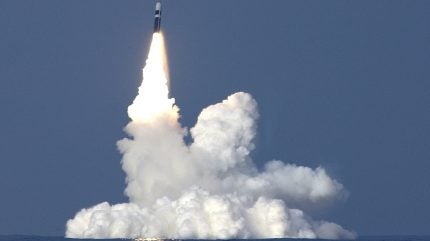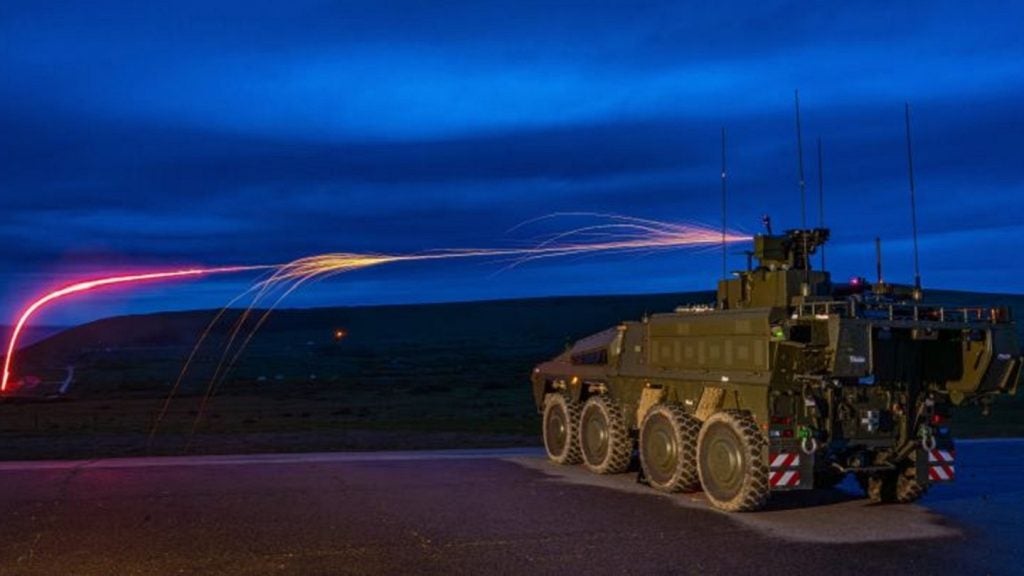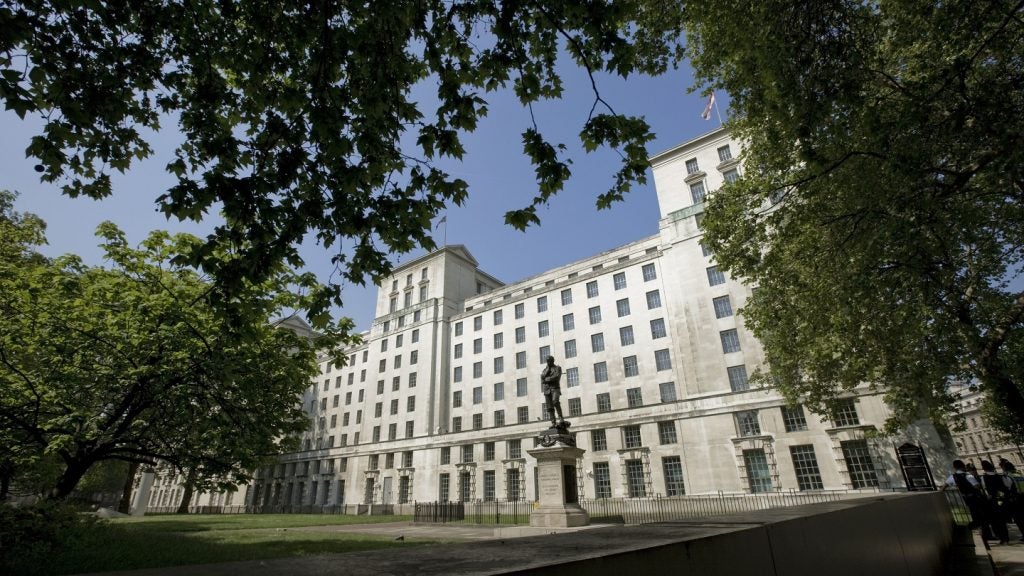
Releasing its political manifesto ahead of the July UK General Election, the Green Party reiterated its opposition to the country’s nuclear deterrent, stating that elected Members of Parliament would push to cancel Trident and remove all foreign nuclear weapons from UK soil.
The UK’s submarine-based nuclear deterrent, also known as Trident, is centred on the Trident II D5 intercontinental ballistic missiles (ICBM) carried by the Royal Navy’s Vanguard-class nuclear-powered ballistic missile submarines (SSBN).
Each of the Vanguard-class SSBNs can each carry up to 16 Trident II D5 missiles, which contain up to eight multiple independent targetable re-entry vehicles (MIRVs) housing Mk4/A ‘Holbrook’ nuclear warheads with a yield of up to 100 kilotons. The new Dreadnought class will be able to accommodate 12 Trident II D5 missiles.
The UK always maintains at least one Trident-equipped SSBN on patrol at all times, a process known as continuous-at-sea-deterrent.
Detailing its defence stance on 12 June at the launch of its manifesto, the Green Party committed to ensure that elected MPs would “push for the UK to sign the UN Treaty on the Prohibition of Nuclear Weapons (TPNW) and following this to immediately begin the process of dismantling our nuclear weapons, cancelling the Trident programme and removing all foreign nuclear weapons from UK soil”.

Opposition to nuclear weapons is a long-standing commitment of the Green Party, which also aligns with its stance on nuclear energy in the civil sector.
How well do you really know your competitors?
Access the most comprehensive Company Profiles on the market, powered by GlobalData. Save hours of research. Gain competitive edge.

Thank you!
Your download email will arrive shortly
Not ready to buy yet? Download a free sample
We are confident about the unique quality of our Company Profiles. However, we want you to make the most beneficial decision for your business, so we offer a free sample that you can download by submitting the below form
By GlobalDataThe US withdrew nuclear weapons from the UK in 2008, but it is thought that such capabilities could be making a return as Nato seeks to toughen its stance amid Russia’s invasion of Ukraine. Nuclear-capable B-52 Stratofortress bombers are routinely based at RAF Lakenheath on rotation as part of US Air Force ‘Bomber Task Forces’ deployments.
The Green Party stance on the UK’s nuclear deterrent is at odds with the stance of the main political parties in the UK, the Conservative and Labour, and Liberal Democrat parties, which have all called, either prior the May General Election announcement or since in manifesto format, for the maintaining of the Trident capability.
The Conservatives and Liberal Democrats released their manifestos earlier this week, with the Labour Party due to follow suit on 13 June.
Greens would seek to end arms sales to Israel
In addition, the Green Party said that its MPs would push for an end to arms sales to Israel, amid the ongoing war in Gaza.
The UK defence sector does produce components and sections of platforms or capabilities that are operated by the Israeli Defence Forces, such as elements of the F-35 stealth fighter, of which up to 15% are claimed to be US origin. It is unclear what impact any such prospective ban on “arms sales” to Israel could have on UK involvement in such programmes.
Conversely, Israeli defence companies have a significant presence in the UK military in maintenance and support roles, as well as the direct sale of equipment such as sensors and training systems.
The Green Party’s manifesto stated that its MP would “continue to support Ukraine as it resists Russian aggression”.
Regarding the Nato defence alliance, the Green Party stated that it recognised that Nato had “an importance role in ensuring the ability of its member states to respond to threats to their security”, and that it would work “within Nato” to achieve “a greater focus on peacebuilding”.
The Green Party would also maintain a commitment to a ‘No First Use’ of nuclear weapons.
A first-strike capability is a cornerstone of maintaining a nuclear deterrent, with the UK’s Trident system able to perform such a role. However, recent test firings by UK submarine of the Trident ballistic missile have been unsuccessful.
Prior to the dissolution of Parliament ahead of the July UK General Election, the Green Party had a single elected MP, although it holds greater representation at county council and local levels.
UK moving ahead with nuclear weapon expansion
In April 2023 it was revealed that the UK had committed more than £800m ($1bn) to a service life extension programme for the Trident II D5 intercontinental ballistic missiles (ICBMs) that are operated by the Royal Navy as part of the country’s strategic continuous at sea nuclear deterrent programme.
The figures came to light in a recent parliamentary written response, detailing the UK’s contribution to the US-led programme to keep Trident II D5 ICBMs in service until at least the 2040s. Broken down, the UK has committed £320.5m to the life extension programme, £140m in sustaining key components, and £361m to extend service life of the missile boost rocket motors, totalling a total cost of £821.5m (approximately $1bn).
The UK maintains its nuclear warheads at Atomic Weapons Establishment (AWE) Aldermaston and Burghfield in Berkshire, west of London, with the sites in 2020 announced that they would be brought back into UK Government control from a consortium led by US defence prime Lockheed Martin.
In 2021, the UK announced that it would increase the number of nuclear warheads in stock, from around 225 currently to about 260. The UK’s current warheads are claimed to be of a UK design but thought to be derived from the US-origin W76 weapon.
An unexpected outing also in 2020 by a senior US Navy official, speaking to the US Senate, of a joint US-UK nuclear warhead upgrade initiative called the W93/Mk7, prompted the then UK Secretary of State for Defence Ben Wallace to confirm the existence of a UK warhead replacement programme.
The new UK warhead will be designed, developed, and manufactured in the UK and housed in the US Mk7 aeroshell, which will house the planned W93 warhead. The Mk7 aeroshell will be procured from the US along with some other non-nuclear components under existing nuclear treaty arrangements, stated a 2023 UK parliamentary report.
Although relatively little is known about the potential costs of creating a new nuclear warhead, it is thought that the UK could spend up to £4bn on the programme.
A March 2024 announcement by the UK Ministry of Defence revealed the Government’s plan to develop a new “sovereign warhead” for use in the Trident II D5 missiles as part of a wider strategy revealed in its Defence Nuclear Command Paper.
In the same document, the UK Government confirmed it had completed the upgrade of its current warheads from the Mk4 to the Mk4A variant.







